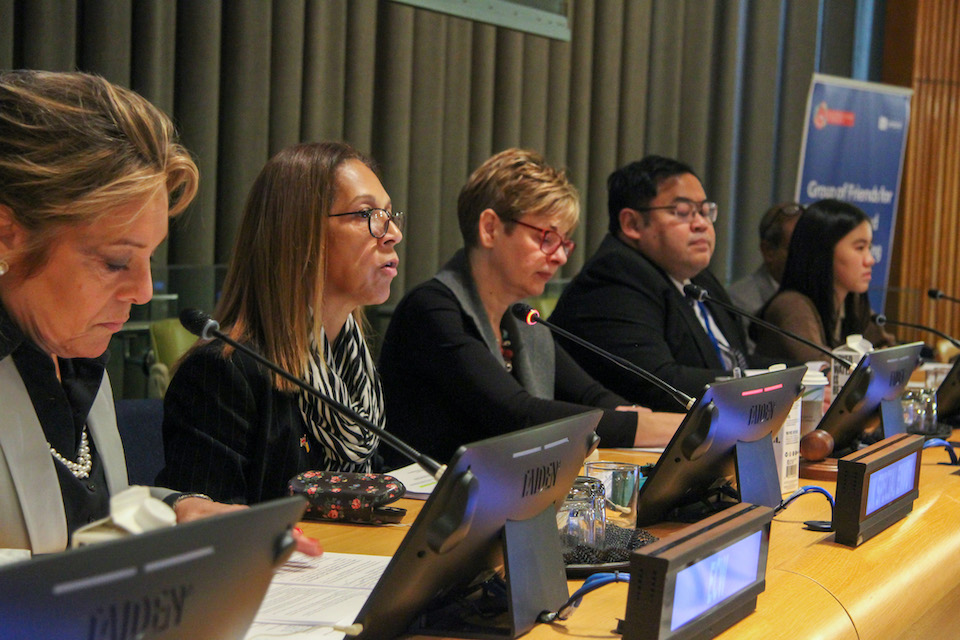We must work together if we want to get girls’ education back on track: Prime Minister's Special Envoy for Girls’ Education
Prime Minister's Special Envoy for Girls’ Education Helen Grant delivered at statement at the UN on International Day of Education

I am delighted to be here with you all on this fifth International Day of Education. I am extremely honoured to be the UK Prime Minister’s Special Envoy for Girls’ Education. I must also agree with you, I am absolutely humbled to hear the testimony of those Afghan women. Brave, brave, women. I shall be taking their messages home with me, back to the UK.
My role as the UK Prime Minister’s Special Envoy for Girls’ Global Education is to globally champion his message that providing every girl on the planet with 12 years of quality education is one of the best ways of tackling many of the problems facing the world today, such as poverty, climate change and inequality.
Investing in girls’ education is a game changer. If we want to change the world for the better, girls’ education is a great, great place to start. The child of a mother who can read is 50% more likely to live beyond the age of five years, twice as likely to attend school themselves, and 50% more likely to be immunised.
We know too, girls who are educated are more able to choose if, when, and how many children they have. Girls’ education is therefore vital to women and girls, but also in levelling-up society, boosting incomes and developing economies and nations.
Refocusing international education finance to countries where the disparities are largest is more important than ever before. This is because the pandemic has become one of the biggest educational disruptors in our history, affecting 1.6 billion learners at the peak of the pandemic in 2020. It has also created a global education funding gap of $200 billion dollars each year. In poorer countries now over 70% of children can’t read a simple text by the age of ten.
So we must work hard, together, better and differently, if we want to get girls’ global education back on track. I think a large part of the answer with financing is to continue with the work that we started in 2021.
At the G7 summit that we hosted in Cornwall, our then Prime Minister Boris Johnson put girls’ education at the very heart of the summit. This ensured that education received the priority and profile it needs and deserves as well as the financial and political commitments.
At the Global Education Summit in London just a few months later in 2021 we raised, with our international partners, $4 billion dollars for global education. This will help another 175 million more children to learn. And of course, further momentum was created by the excellent Transforming Education Summit that took place here, in America, in September last year. Bit I think we also need to be more innovative in terms of finance.
This is why the UK is supporting the International Finance Facility for Education – and this is an amazing facility for leveraging additional funding for children in Lower Middle-Income
Countries – up to seven times what can be derived from a simple donor grant. We also support the Education Outcomes Fund – which emphasises payment by results and we are pioneering this approach in Sierra Leone and Ghana.
Regarding adjusting our programs to reach the most marginalised girls, this is absolutely critical and there are many examples I can give but in the interest of time I would say that a good example of our work is what we’re doing around climate change.
There are 200 million of the most marginalised women and girls living on the front line of climate change and we are never going to tackle SDG4 unless we tackle climate change.
At COP26 in Glasgow, we made the important connection between girls’ education and climate change. Showing how girls’ education can be very much a part of the solution.
Because girls who are educated are more able to participate in decisions, actions and leadership, on climate resilience, adaptation and mitigation. Our work in this area has led to the recently published climate paper that was launched by Minister Andrew Mitchell. And of course now we are full steam ahead with our preparations for COP28.
Again, in the interest of time I am going to close their but just to say I know the weight of the challenge of girls’ education is considerable. It is significant. But our ability to make change in the world world, if we work together, should never ever be underestimated.
Thank you.